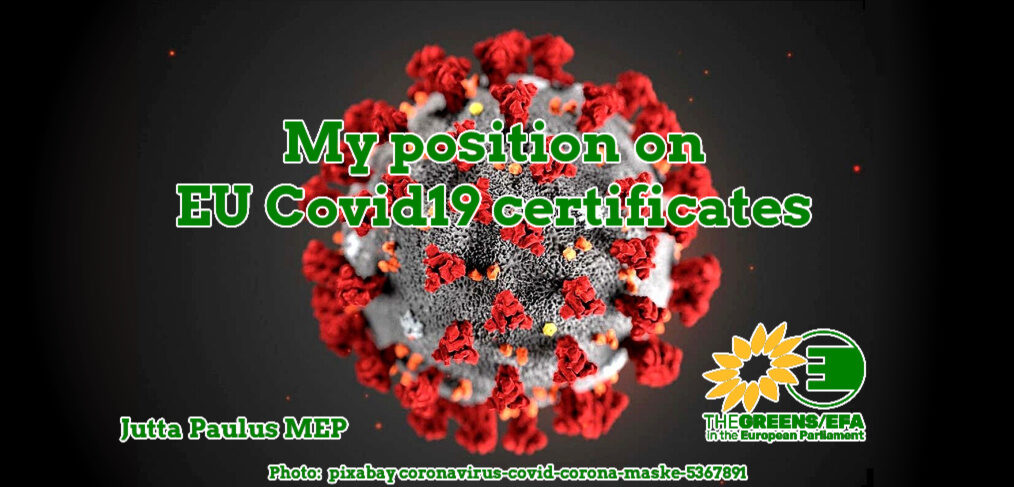
My position on EU Covid19 certificates
I have received numerous questions from across the EU on the planned EU Covid19 certificates. Thank you to all citizens for participating in this important debate!
The European Parliament has now voted its position on Covid19 certificates and will enter negotiations with the Council and the Commission. Some EU Member States have already announced that they will continue to rely on national go-it-alone measures or do so in parallel. This is the wrong way to go, because we finally need a harmonised solution. In the negotiations with the Member States, it is also important to prevent scientifically unsupported assumptions from being included in the certificates or the free test offer at the border, which we Greens fought hard for, from being overturned. And of course, the data protection requirements demanded by the European Parliament must not be watered down under any circumstances.
For me, the EU Covid19 certificate offers the possibility to document medical data with comparable standards. Common rules for documenting vaccination, test and recovery status on Covid19 are important to facilitate mutual recognition of tests and vaccinations in the EU. Currently, due to the confusing and inconsistent rules on the validity period of tests, people who need to travel for work are stuck in the bureaucracy of the member states. The European Parliament therefore calls for common criteria for the recognition of tests and vaccinations to facilitate freedom of travel. There must be freedom of choice between paper and digital certificates.
So what was voted on 29 April?
EU Covid19 certificates must not restrict or guarantee fundamental freedoms. The Covid19 certificate must therefore not be a prerequisite for travel. People who cannot or do not want to be vaccinated must not be disadvantaged. Therefore, the EU member states must offer tests free of charge and nationwide. Nor must a false sense of security be created. For the time being, the distance and hygiene rules remain the most important measures to contain the pandemic. This also includes personal, responsible avoidance of non-essential travel.
EU Covid19 certificates, however, must be based on scientific principles without exception. It is good that they may only be issued for vaccines authorised by the European Medicines Agency EMA or the World Health Organisation WHO. On the other hand, they contain the questionable assumption that a person is immune 10 days after the first positive test result. This was unfortunately only supplemented by an optional test for antibodies. I am also not happy with the equation of rapid tests and PCR tests; at least only tested rapid tests with at least 90% sensitivity and 97% specificity are recognised.
In any case, it must be ensured that the EU Covid19 certificate contains only the most necessary personal data and that the EU General Data Protection Regulation is complied with. The unauthorised storage or even disclosure of patient data by airlines, hotels and other commercial and governmental actors thus becomes punishable. Member states and the Commission must consistently prosecute offences in this area.
Many who wrote to me were also concerned about the security of the certificates against forgery. Now, admittedly, I am not an expert in this field. However, the expert members of our parliamentary group have given a positive assessment of the public-private key infrastructure procedure. What is worrying, however, is the procedure planned by Federal Health Minister Spahn in Germany, according to which any doctor’s practice or pharmacy would be allowed to issue a digital certificate “without complications” on the basis of the entries in the yellow paper vaccination passport. Fake vaccination certificates are already being offered on the internet! Here, safety must take precedence over speed: an entry can only be made by the body that carried out the vaccination and can verify this on the basis of its own documentation.
Conclusion: The European Parliament has developed an overall good position on the planned Covid19 certificates. The unsatisfactory requirements for the recovery status must be readjusted in the negotiations with the Commission and the Council. Under no circumstances must there be a worsening of the demands adopted by the Parliament, especially with regard to an undermining of data protection and the recognised vaccines and tests.
